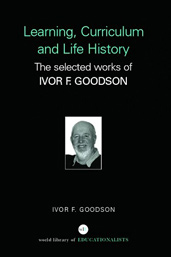Learning, Curriculum and Life Politics: the selected works of Ivor F. Goodson
Coming to Curriculum
Youth culture and WC (working class) culture are broadly similar in whole areas. This is particularly true, I would say, in reference to authority. Therefore a teacher who has experienced youth culture and carries it over into his teaching (whether he or she be a week-end beatnik or a life-styler!) should find himself well-placed and in empathy with WC kids.
You see it’s interesting that you mention Lennon and Best - they typify one strand in youth culture and WC culture - the rebel (in this case with a cause I think!).
I find it hard to believe that many WC kids will take teachers seriously who take school seriously. I mean this solely in the sense of ‘image’. Something you've not touched on – and yet it's part of the vocabulary of many WC kids.
Schools are ‘hate objects’ in the internal language of the WC. You go to them in much the same spirit you go to the factory - by the time you are a teenager that is. You learn to hate every hypocrisy and fallacy that they stand for. A teacher who fully identifies with the school therefore encounters a similar response (letter to Walker 1973).
Two other notes I found on old bits of paper from 1972 spell out more of the approach and pinpoint my predominant concerns at this stage in my life in teaching.
For the WC Child
1. The person comes before the role in deciding if you learn from a teacher. Learning will only go on if the person is accessible and acceptable. It is the first threshold.
2. The person can be adjudged at a number of levels. Certain factors seem to predispose the kids in liking teachers.
(a) An ability to joke and be joked with - a classic WC 'testing' mechanism (Scwartz calls it 'sounding' among black youth in New York).
(b) An irreverence, rebelliousness like their heroes.
(c) A general acceptance of laughs and fun as essential ingredients of life.
